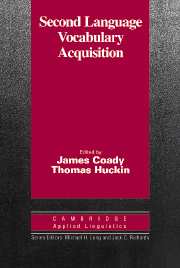Book contents
- Frontmatter
- Contents
- List of contributors
- Series editors' preface
- Acknowledgments
- I SETTING THE STAGE
- Chapter 1 Historical trends in second language vocabulary instruction
- Chapter 2 The lexical plight in second language reading: Words you don't know, words you think you know, and words you can't guess
- Chapter 3 Orthographic knowledge in L2 lexical processing: A cross-linguistic perspective
- II CASE STUDIES
- III EMPIRICAL RESEARCH
- IV PEDAGOGY
- V SUMMING UP
- Author index
- Subject index
Chapter 3 - Orthographic knowledge in L2 lexical processing: A cross-linguistic perspective
Published online by Cambridge University Press: 05 October 2012
- Frontmatter
- Contents
- List of contributors
- Series editors' preface
- Acknowledgments
- I SETTING THE STAGE
- Chapter 1 Historical trends in second language vocabulary instruction
- Chapter 2 The lexical plight in second language reading: Words you don't know, words you think you know, and words you can't guess
- Chapter 3 Orthographic knowledge in L2 lexical processing: A cross-linguistic perspective
- II CASE STUDIES
- III EMPIRICAL RESEARCH
- IV PEDAGOGY
- V SUMMING UP
- Author index
- Subject index
Summary
Introduction
During the last decade, there has been a growing interest in vocabulary acquisition among second language (L2) researchers. The research stockpile has expanded in scope and complexity at a remarkable rate for the brief period of time. Despite the increasing number of empirical studies, however, relatively little attention has been given to orthographic considerations. In view of the major gains in L2 vocabulary research, the gap has become problematic.
Conceivably, the minimal concern with orthographic knowledge may stem from the predominance of top-down approaches to L2 reading research over the last decade. More than 60% of the empirical research between 1974 and 1988 reflected this perspective (Bernhardt, 1991). As a consequence, scant work had been done on lower-level verbal processing mechanisms until very recently, and the role and function of orthographic knowledge remain largely unexplored.
There are compelling reasons, however, to believe that orthographic knowledge plays a critical part in L2 reading, particularly in lexical processing. Current L2 vocabulary studies, for example, consistently demonstrate that the ability to utilize context in inferring the meaning of unknown words is highly correlated with reading proficiency (e.g., Chern 1993; Haynes, 1984). And, even more important, the failure to use context for lexical inference is, in many cases, attributable to word misidentification (Huckin &: Bloch, 1993). When L2 learners mistakenly assume they know a word, they tend to ignore various contextual clues that highlight the semantic incongruity resulting from the misidentification.
- Type
- Chapter
- Information
- Second Language Vocabulary AcquisitionA Rationale for Pedagogy, pp. 35 - 52Publisher: Cambridge University PressPrint publication year: 1996
- 1
- Cited by



